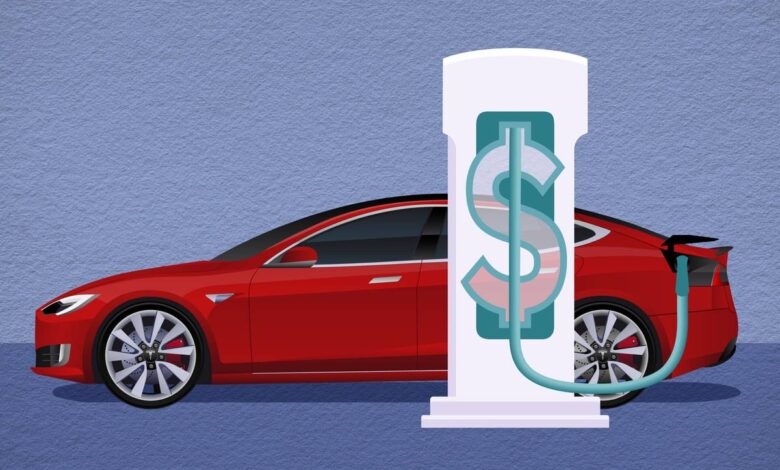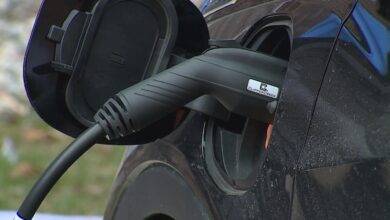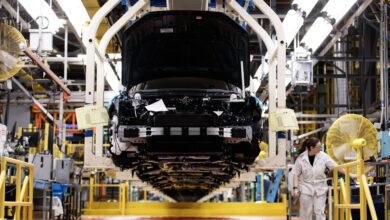What Are the Hidden Costs of Owning an Electric Car?

Beyond the satisfaction of being greener, part of the appeal of owning an EV is spending no more of your green on gasoline, oil changes and the other inexorable costs of owning an internal combustion vehicle. You want to do your part for the planet by taking the plunge on an electric vehicle, but you’re not made of money. Are there hidden costs that could make owning an EV as much or more expensive?
Related: What to Know Before Purchasing an Electric Vehicle: A Buying Guide
The evidence is no, not over time. A study commissioned by the Natural Resources Defense Council analyzed the all-in cost of ownership for a selection of EVs and for comparable gasoline vehicles. It found that for every major class of vehicle, the EV was cheaper to own over a seven-year period — less than the average reported time people keep a new vehicle. The computed costs included purchase price (minus the expected value after seven years), propellant (electricity or gasoline), maintenance, repairs, insurance, taxes and fees.
That does not mean, however, that there won’t be expenses that might be different, and perhaps unexpected, for buyers new to an EV. The differences are by no means an argument against buying an EV — in the long run, it should be a positive financial choice — but knowing what to expect along the way can increase owner satisfaction and the ability to budget for costs such as the following.
Higher Initial Price
It’s no secret, but electric cars generally are more expensive initially than their gasoline or hybrid counterparts. That gap has narrowed some with recent price cuts (particularly for the bestselling EV automaker Tesla), but the bulk of available EVs remain at premium prices. In fact, the average list price for new EVs in April was $62,927 versus an average of $49,111 overall for all new vehicles, per Cars.com data. Federal tax credits can help narrow that gap if you and the vehicle qualify, and in some locations, additional state and local subsidies can close it further.
Uncertain Depreciation
The same recent price cuts on new EVs have created downward pressure on the value of that EV if you want or need to sell it. Used-EV prices in April were down 20.2% from a year earlier versus a decline of 6.3% in used-vehicle prices overall, according to Cars.com data. Of course, that math works in your favor if you’re shopping for a used EV, some of which also qualify for their own federal tax credit.
Home Charger Installation
Having a charger at home can make a big difference in the cost of EV operation and convenience — even more so in areas with spotty public charger availability. Typically, home rates for juice are substantially lower than public charger rates (particularly for DC fast chargers), and you also can more easily take advantage of even lower time-of-day rates where applicable.
Though charger installation costs can vary widely from a few hundred bucks to much more — you can see what it cost six Cars.com editors with different home situations here — we recommend it regardless. A charger installation is also a one-time expense and can add to the value of a home.
Rising Electricity Rates
Electricity rates have been rising overall and are expected to continue to go up with the need for more generation and upgraded distribution lines — though that’s more down to the proliferation of huge new data centers rather than EVs. Electricity rates, as well as time-of-day and meter charges, vary widely by region and state, but the good news is that an analysis by The Washington Post found that it’s still cheaper to fill up with electrons in all 50 states than it is to fill up a gas tank, though in some regions, it’s much more so than others.
Scheduled Maintenance and Repair Costs
EVs typically cost less to maintain thanks to fewer mechanical parts, as well as less of the regular maintenance that internal combustion engines require, such as oil changes. EVs also require less maintenance for their conventional friction brakes since their regenerative braking systems handle much of the work slowing the vehicle.
But a Consumer Reports reliability survey found that owners reported an average of 79% more problems for EVs than for gasoline vehicles, and repairs, such as those required by collision damage, can be a little or a lot more expensive depending on the vehicle. Both of these can be explained partly by the fact that EVs are generally more expensive and have more high-tech electronics. Repairs also might require more automaker-sourced parts and skilled labor.
More Tire Wear
A 20% reduction in tire longevity is a commonly cited rule of thumb, though wear varies by EV and can be worse for vehicles with softer performance-oriented tires. Overall, though, EVs can be harder on tires because of their higher weight compared to similar gasoline vehicles thanks to their batteries and an EV’s instantly available torque and quicker acceleration, which is always tempting to use.
Higher Insurance Premiums
For now, it can be more expensive to insure an EV due to their higher average prices and the potentially higher costs for damage repair. Forbes Advisor reports that the average annual cost of insurance for an EV is $3,546 versus $2,567 for the average gasoline vehicle. Note that the averages can vary a lot by state and city, as well as based on annual mileage, driver age and driving record. Some companies offset the premiums with “green car” discounts for EVs.
State EV Fees
The National Conference of State Legislatures reports that 32 states assess EV-specific annual fees intended to compensate for the loss of gasoline tax revenue, a primary income source for roads as well as, in some states, other transportation needs (e.g., public transit or more charging stations). Gas tax revenue already has declined as conventional vehicle efficiency has improved, and some states add an EV fee that also applies to plug-in hybrids; the fees generally range from $50 to $200 and are sometimes also indexed to rise with inflation. A proposed alternative being tried with some state pilot projects is to switch to an annual vehicle fee based on miles driven, regardless of powertrain.
Battery Capacity Loss
Complete failure of an expensive EV drive battery is rare and likely to be covered by the car’s battery warranty, which is required to be at least eight years or 100,000 miles and is significantly longer for some vehicles. But all batteries lose capacity — EV range and power — with time and use. Some warranties guarantee against a loss of more than 25% or 30%, which helps. Battery capacity loss is not an out-of-pocket cost, but it is a loss of value. You can read details about battery life here on Cars.com.
More From Cars.com:
Cars.com’s Editorial department is your source for automotive news and reviews. In line with Cars.com’s long-standing ethics policy, editors and reviewers don’t accept gifts or free trips from automakers. The Editorial department is independent of Cars.com’s advertising, sales and sponsored content departments.



